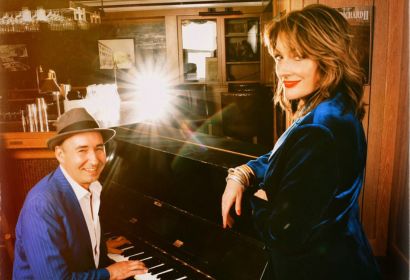Since skyrocketing to fame from the wild underground parties of Brooklyn, the Hot Sardines has been described by The New York Times as “potent and assured” and The Times of London as “simply phenomenal.” The group’s brand of reinvigorated classic jazz has earned the group more than 60 million digital streams across platforms.
Quality is timeless. Just ask The Hot Sardines.
In the talented hands of the New York-based ensemble, music first made famous decades ago comes alive through their brassy horn arrangements, rollicking piano melodies and vocals from a chanteuse who transports listeners to a different era with the mere lilt of her voice. On French Fries & Champagne, The Hot Sardines’ new album for Universal Music Classics, the jazz collective broadens its already impressive palette, combining covers and originals as they effortlessly channel New York speakeasies, Parisian cabarets and New Orleans jazz halls.
Bandleader Evan Palazzo and lead singer Elizabeth Bougerol met in 2007 after they both answered a Craigslist ad about a jazz jam session above a Manhattan noodle shop. The unlikely pair — she was a London School of Economics-educated travel writer who grew up in France, Canada and the Ivory Coast, he was a New York City born and raised actor who studied theater at the University of the Arts in Philadelphia—bonded over their love for Fats Waller. Influenced also by such greats as Dinah Washington, Louis Armstrong and Billie Holiday, they began playing open mic nights and small gigs and by 2011, they headlined Midsummer Night Swing at New York’s Lincoln Center.
The Hot Sardines’ self-titled debut album, named by iTunes as one of the best jazz albums of 2014, spent more than a year on the Billboard Jazz Chart, debuting in the top 10 alongside Tony Bennett and Lady Gaga. The accolades began pouring in for the band: Downbeat called The Hot Sardines “one of the most delightfully energetic bands on New York’s ‘hot’ music scene,” while The London Times praised their “crisp musicianship” and “immaculate and witty showmanship,” declaring them “simply phenomenal.”
“We found ourselves in the perfect place at the perfect time,” says Evan. “As we explored this 100 year-old jazz, we began to look at it as a journey forward, not so much as a look back. This is music for today, not a museum piece.”
The Hot Sardines played more than 100 shows last year, taking their act from their familiar confines of New York across the country. And, to no one’s surprise but their own, they were greeted by music lovers everywhere. “It never really occurred to me that anyone was listening to us outside of New York City. To show up in a town and have people say, ‘I love this song. I love this video’ is mind-blowing to me,” says Elizabeth, who adds she remembers the towns by the food, seeking out “whatever that region does really well — we’re constantly in the tour van, researching mom-and-pop places in the next town.” In the hot jazz movement, The Hot Sardines stand apart for the innovation, verve and sheer joy they bring to music, both new and old. “It’s a really cool time to be making music,” Elizabeth says. “Especially if you’re making music that started its life 100 years ago.”












